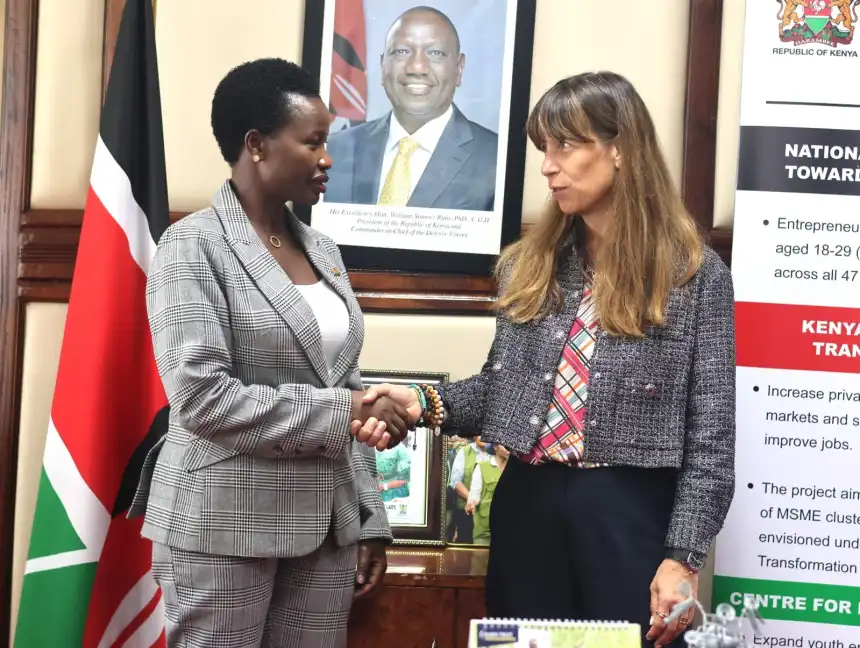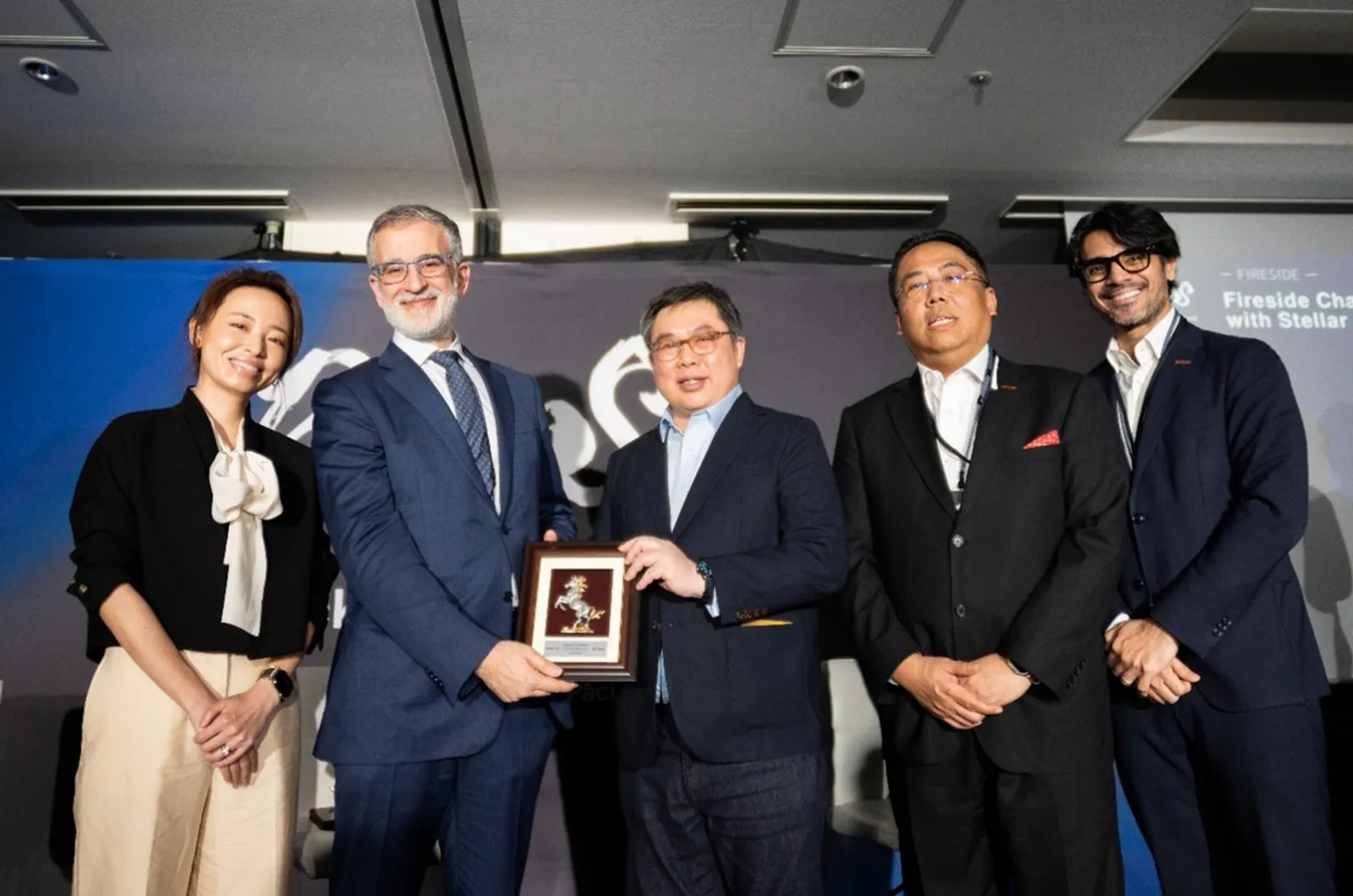In a significant move set to redefine its economic trajectory, Kenya is forging a deeper, more transformative partnership with the European Bank for Reconstruction and Development (EBRD). This burgeoning alliance, underscored by Kenya’s pursuit of full EBRD membership and recipient country status, embodies a powerful collective commitment to unleash the full potential of Micro, Small, and Medium Enterprises (MSMEs) as the undeniable driving force behind the nation’s ambitious economic transformation.
On Wednesday, June 11, 2025, Principal Secretary, State Department of Micro, Small and Medium Enterprises (MSMEs), Susan Mang’eni, held a strategic meeting with high-ranking EBRD officials. Her resolute message highlighted that this partnership is not merely transactional, but a profound commitment to collaborative growth, fostering a future where Kenyan businesses, large and small, can thrive and contribute to a more inclusive and industrialized economy. “We held a strategic meeting with the EBRD, marking a key step toward Kenya’s pursuit of EBRD membership and recipient country status, which the Cabinet approved on 14 February 2024,” PS Mang’eni affirmed, signaling a clear path forward for this pivotal collaboration.
The EBRD: A Global Partner in Transition
The European Bank for Reconstruction and Development (EBRD) boasts a rich history spanning over three decades, marked by its unwavering dedication to fostering private sector development in emerging economies. Established in 1991 to aid the post-Cold War transition of central and eastern European nations, the EBRD has since expanded its operations across three continents, becoming a beacon of financial expertise and a catalyst for systemic change. Its unique mandate extends beyond mere financial investment; it is committed to supporting countries that actively apply the principles of multi-party democracy and pluralism, weaving good governance, economic resilience, inclusivity, and sustainable development into its core operations.
The Bank’s operational model is distinct. It primarily invests in private-sector projects on commercial terms, offering a comprehensive suite of financial instruments including loans, equity investments, and guarantees. Critically, the EBRD integrates environmental considerations into all its projects, with a strong commitment to its Green Economy Transition (GET) approach, ensuring that the majority of its business volume contributes to green initiatives and aligns fully with the Paris Agreement on climate change. This dual focus on private sector growth and environmental stewardship makes the EBRD an ideal partner for Kenya, a nation increasingly prioritizing both economic development and sustainable practices.
Over the years, the EBRD has invested over €210 billion in more than 7,500 projects, demonstrating its capacity to drive tangible change. Its expansion into Sub-Saharan Africa, which includes Kenya, signifies a new chapter in its mission, leveraging its financial resources and expertise to boost African economies and create fresh opportunities for their people. For Kenya, gaining recipient country status means unlocking access to this vast pool of financial resources and, equally important, the Bank’s profound knowledge in navigating complex economic transitions.
MSMEs: The Unsung Heroes of Kenya’s Economic Tapestry
In Kenya, MSMEs are not just a segment of the economy; they are its very heartbeat. These micro, small, and medium-sized enterprises represent over 90% of all businesses in the country, contributing a substantial 30% to the national Gross Domestic Product (GDP) and employing a staggering 15 million people. They are the daily breadwinners for countless families, the incubators of innovation, and the bedrock of entrepreneurship, particularly at the grassroots level. From the bustling informal markets of Nairobi to the burgeoning agri-businesses in rural counties, MSMEs embody the resilience and ingenuity of the Kenyan spirit.
However, these vital enterprises often face formidable challenges that impede their growth and ability to contribute more significantly to the national economy. These hurdles include:
- Limited Access to Affordable Finance: This is perhaps the most pervasive challenge. Many small businesses struggle to secure loans from traditional banks due to high-interest rates, stringent collateral requirements, and complex application processes. This financing gap stifles expansion, limits investment in critical areas like technology, and prevents businesses from seizing market opportunities.
- Inadequate Infrastructure: Unreliable electricity supply, poor road networks, and insufficient internet connectivity, particularly in rural areas, significantly increase the cost of doing business and restrict market access for MSMEs. Imagine a small tailoring shop losing production hours due to frequent power outages, or a farmer struggling to transport perishable goods to market due to impassable roads.
- Regulatory and Tax Compliance Burdens: Navigating Kenya’s often complex regulatory landscape can be daunting for small business owners. The costs and intricacies associated with licenses, permits, and tax regulations can overwhelm entrepreneurs, diverting precious time and resources away from core business activities.
- Lack of Skilled Labor: Many MSMEs struggle to find and retain employees with the specific skills needed for growth, often due to a mismatch between available skills in the job market and industry demands, or limited resources for employee training.
- Limited Market Linkages: Connecting to larger value chains, both domestically and internationally, remains a significant challenge for many MSMEs, hindering their ability to scale and diversify their customer base.
The partnership with the EBRD is specifically tailored to address these critical pain points. By providing tools, capital, and a framework for policy reform, the collaboration aims to empower MSMEs, transforming them from vulnerable entities into robust, competitive players at the core of Kenya’s industrialization drive and inclusive growth agenda.
Fueling the ‘Bottom-Up’ Revolution: BETA and the EBRD Synergy
Kenya’s current economic blueprint, the Bottom-Up Economic Transformation Agenda (BETA), is designed to achieve an economic turnaround and inclusive growth through a value chain approach. Unlike previous top-down models, BETA focuses on stimulating economic activity from the ground up, prioritizing sectors with the highest impact on ordinary citizens. Its ambitious objectives include:
- Bringing down the cost of living: Making essential goods and services more affordable for all Kenyans.
- Eradicating hunger: Enhancing food security through improved agricultural productivity.
- Creating jobs: Generating widespread employment opportunities, especially for the youth.
- Expanding the tax base: Fostering formalization and growth of businesses to increase government revenue.
- Improving foreign exchange balances: Boosting exports and attracting foreign investment.
- Ensuring inclusive growth: Ensuring that economic benefits are shared equitably across all segments of society.
BETA is built upon five core pillars of targeted investment: Agriculture, Micro, Small and Medium Enterprise (MSME) Economy, Housing and Settlement, Healthcare, and the Digital Superhighway and Creative Economy. The engagement with the EBRD directly feeds into the MSME Economy pillar, providing crucial support to a sector identified as central to the achievement of BETA’s overarching goals.
“Kenya’s collaboration with global development finance institutions, such as the EBRD, will provide the tools, capital, and reforms necessary to place MSMEs at the core of industrialization and inclusive growth, as envisaged in the Bottom-Up Economic Transformation Agenda (BETA),” PS Mang’eni reiterated. This alignment is vital, ensuring that international support is channeled effectively to bolster national development priorities and directly impact the lives of millions of Kenyans.
The Industrialization Imperative: 20% by 2030
A major priority for Kenya’s economic future is to elevate the manufacturing sector’s contribution to the national GDP. The ambitious national target is to achieve a 20% contribution of manufacturing to Kenya’s GDP by 2030. This target is not merely a statistical aspiration; it is a critical pathway to sustainable job creation, technological advancement, and economic diversification, reducing reliance on raw material exports and building a more resilient economy.
Currently, Kenya’s manufacturing sector faces various challenges, including competition from imports, high energy costs, and insufficient linkages between local industries and global supply chains. However, the government recognizes that MSMEs are indispensable to achieving this industrialization target. Many MSMEs operate in the value-added sectors, transforming raw agricultural produce into processed goods, manufacturing consumer products, or providing essential inputs for larger industries. By strengthening these enterprises, Kenya can bolster its local production capacity, reduce import dependence, and create a robust domestic manufacturing base.
The EBRD’s support will be instrumental in strengthening Kenya’s manufacturing and value-added sectors. This could involve direct financing for MSMEs looking to upgrade their machinery, adopt new technologies, or expand their production lines. It could also entail technical assistance to help businesses meet international quality standards, improve efficiency, and integrate into regional and global value chains. The 2025 Route to Market Strategy, for instance, emphasizes market diversification, digital preparedness, compliance, and financial resilience for MSMEs, all areas where EBRD’s expertise can provide significant leverage.
Deeper Collaboration: The Pillars of Support
The meeting between PS Mang’eni and EBRD officials explored various concrete areas of collaboration, each designed to address the specific needs of Kenyan MSMEs and accelerate the nation’s industrialization journey:
1. Technical Support: Equipping Businesses for Success
Technical support from the EBRD extends far beyond financial grants. It encompasses a comprehensive suite of services aimed at enhancing the operational efficiency, competitiveness, and sustainability of MSMEs. This includes:
- Strategic Business Advice: Experts from EBRD and its partner networks provide tailored advice on business planning, market entry strategies, financial management, and operational optimization. For a small manufacturing firm, this could mean guidance on improving its production process to reduce waste and costs, or developing a robust marketing strategy to reach new customers.
- Training and Mentoring Programs: These initiatives build the capacity of MSME owners and their employees. Training can cover areas such as financial literacy, digital skills, quality control, export procedures, and environmental best practices. Mentoring, on the other hand, provides personalized guidance, connecting experienced entrepreneurs with promising MSMEs to help them navigate challenges and seize opportunities.
- Digital Transformation: In an increasingly interconnected world, digital literacy and adoption are critical. The EBRD supports MSMEs in embracing digital tools for e-commerce, online marketing, inventory management, and financial record-keeping, enhancing their reach and efficiency. This could involve facilitating access to affordable software solutions or providing training on digital platforms.
- Sustainable Business Practices: Aligning with its Green Economy Transition mandate, the EBRD helps MSMEs adopt greener technologies and sustainable operational practices. This not only reduces their environmental footprint but can also lead to cost savings and increased market appeal, particularly for environmentally conscious consumers and international buyers.
2. Policy Reform: Creating a Conducive Ecosystem
The EBRD’s engagement in policy reform is crucial for creating an enabling environment where MSMEs can truly flourish. This involves working with the Kenyan government to:
- Streamline Regulatory Frameworks: Simplifying complex licensing procedures, reducing bureaucratic hurdles, and improving the ease of doing business are vital. This directly reduces the burden on MSMEs, allowing them to focus on growth rather than compliance.
- Enhance Good Governance: Promoting transparency, accountability, and fair competition in the business environment builds investor confidence and reduces the risk of corruption. A predictable and equitable legal and regulatory framework is essential for attracting both domestic and foreign investment.
- Improve Access to Information: Ensuring that MSMEs have easy access to information on market opportunities, regulations, financing options, and support programs is critical for their informed decision-making.
By collaborating on policy reforms, the EBRD helps Kenya build stronger institutions and a more robust economic framework that is conducive to private sector growth and investment.
3. Access to Affordable Finance: Unlocking Growth Potential
This is arguably the most impactful area of collaboration. The EBRD’s approach to financial support for MSMEs is multi-pronged:
- On-lending through Local Financial Institutions: A key mechanism is providing senior loans or credit lines to Kenyan banks and local development finance institutions. These local partners then on-lend to MSMEs at more favorable terms, increasing the availability of affordable credit where it’s most needed. This also strengthens the capacity of local financial institutions to serve the MSME sector more effectively.
- Direct Financing: For larger, more complex MSME projects, the EBRD may provide direct loans or equity investments, offering a level of capital that might otherwise be unavailable through traditional channels.
- Guarantees and Trade Finance: The EBRD’s Trade Facilitation Programme (TFP) provides guarantees to international commercial banks, covering political and commercial payment risks for transactions undertaken by partner banks in countries where the EBRD operates. This facilitates vital import and export activities for MSMEs, connecting them to global markets. This support can also include short-term loans for pre-shipment and post-shipment finance, essential for companies engaged in international trade.
- Tailored Financial Products: The EBRD encourages local financial institutions to develop tailored financial products for MSMEs, including working capital loans, investment loans for capital expenditures, overdrafts, and credit lines, catering to their diverse needs across various sectors.
The impact of increased access to finance for MSMEs is profound. Studies, including those by the World Bank, have shown a strong positive relationship between access to finance and job growth, particularly for smaller firms. MSMEs with access to loans can exhibit employment growth several percentage points higher than those without. This capital allows them to invest in technology, diversify products, strengthen supply chains, and ultimately grow, leading to sustainable job creation and enhanced business continuity, particularly during economic downturns. It’s about giving a small business owner the means to expand their shop, buy new equipment, or hire more people, creating a ripple effect of prosperity in their community.
The Human Face of Progress: A Better Life for Kenyans
Ultimately, the success of this partnership will be measured not just in economic indicators, but in its tangible impact on the lives of ordinary Kenyans. The deepening ties with the EBRD promise:
- More Jobs, Better Livelihoods: As MSMEs grow and industrialization accelerates, more employment opportunities will be created, offering sustainable incomes for families and lifting communities out of poverty. Imagine a young graduate finding meaningful work in a thriving local factory, or a woman entrepreneur expanding her business and employing others.
- Increased Income and Reduced Poverty: Enhanced productivity and market access for MSMEs mean higher incomes for entrepreneurs and their employees, contributing directly to poverty reduction at the household level.
- Improved Quality of Life: The broader economic growth spurred by a flourishing MSME sector leads to improved access to essential services, better infrastructure at the local level, and a higher standard of living for all citizens.
- Empowerment and Inclusivity: The focus on MSMEs, particularly those owned by women and youth, fosters greater economic inclusion, empowering marginalized groups and ensuring that the benefits of growth are widely distributed. PS Mang’eni has consistently championed MSME inclusion in global value chains, recognizing their potential to empower vulnerable populations.
- Innovation and Diversification: Support for innovation and technology adoption within MSMEs can lead to the development of new products and services, fostering a more dynamic and diversified economy.
Navigating the Path Forward: Challenges and Opportunities
While the partnership with the EBRD presents immense opportunities, navigating the path forward will require sustained effort and commitment. Key considerations include:
- Effective Implementation: Translating policy frameworks and financial commitments into tangible on-the-ground impact will require strong coordination between government agencies, local financial institutions, and the EBRD.
- Capacity Building: Ensuring that Kenyan institutions and businesses have the capacity to absorb and effectively utilize the technical assistance and financial resources provided will be crucial.
- Transparency and Accountability: Maintaining high standards of transparency and accountability in project selection, financing, and implementation will be essential to build trust and ensure the sustainable impact of the partnership.
- Adapting to Evolving Needs: The MSME landscape is dynamic. The partnership must remain flexible and responsive to the evolving needs of the sector, ensuring that support remains relevant and impactful.
Despite these challenges, the outlook for Kenya is overwhelmingly positive. Its vibrant entrepreneurial spirit, coupled with a government committed to inclusive growth and industrialization, creates a fertile ground for the EBRD partnership to yield significant results. This collaboration represents a potent blend of global expertise and local ambition, poised to unlock new avenues of prosperity for millions of Kenyans.
A Future Built Together
Kenya’s deepening ties with the EBRD mark a defining moment in its journey towards economic transformation. It is a testament to the government’s strategic foresight, recognizing that sustainable growth and inclusive development are best achieved through powerful, collaborative partnerships. By placing MSMEs at the very core of its industrialization strategy and leveraging the EBRD’s extensive experience and resources, Kenya is not just building businesses; it is building a more resilient, equitable, and prosperous future for its people. The seeds of this future are being sown today, promising a rich harvest of opportunities for generations to come.
Ready to take your career to the next level? Join our dynamic courses: ACCA, HESI A2, ATI TEAS 7 , HESI EXIT , NCLEX – RN and NCLEX – PN, Financial Literacy!🌟 Dive into a world of opportunities and empower yourself for success. Explore more at Serrari Ed and start your exciting journey today! ✨
photo source: Google
By: Montel Kamau
Serrari Financial Analyst
12th June, 2025
Article, Financial and News Disclaimer
The Value of a Financial Advisor
While this article offers valuable insights, it is essential to recognize that personal finance can be highly complex and unique to each individual. A financial advisor provides professional expertise and personalized guidance to help you make well-informed decisions tailored to your specific circumstances and goals.
Beyond offering knowledge, a financial advisor serves as a trusted partner to help you stay disciplined, avoid common pitfalls, and remain focused on your long-term objectives. Their perspective and experience can complement your own efforts, enhancing your financial well-being and ensuring a more confident approach to managing your finances.
Disclaimer: This article is for informational purposes only and does not constitute financial advice. Readers are encouraged to consult a licensed financial advisor to obtain guidance specific to their financial situation.
Article and News Disclaimer
The information provided on www.serrarigroup.com is for general informational purposes only. While we strive to keep the information up to date and accurate, we make no representations or warranties of any kind, express or implied, about the completeness, accuracy, reliability, suitability, or availability with respect to the website or the information, products, services, or related graphics contained on the website for any purpose. Any reliance you place on such information is therefore strictly at your own risk.
www.serrarigroup.com is not responsible for any errors or omissions, or for the results obtained from the use of this information. All information on the website is provided on an as-is basis, with no guarantee of completeness, accuracy, timeliness, or of the results obtained from the use of this information, and without warranty of any kind, express or implied, including but not limited to warranties of performance, merchantability, and fitness for a particular purpose.
In no event will www.serrarigroup.com be liable to you or anyone else for any decision made or action taken in reliance on the information provided on the website or for any consequential, special, or similar damages, even if advised of the possibility of such damages.
The articles, news, and information presented on www.serrarigroup.com reflect the opinions of the respective authors and contributors and do not necessarily represent the views of the website or its management. Any views or opinions expressed are solely those of the individual authors and do not represent the website's views or opinions as a whole.
The content on www.serrarigroup.com may include links to external websites, which are provided for convenience and informational purposes only. We have no control over the nature, content, and availability of those sites. The inclusion of any links does not necessarily imply a recommendation or endorsement of the views expressed within them.
Every effort is made to keep the website up and running smoothly. However, www.serrarigroup.com takes no responsibility for, and will not be liable for, the website being temporarily unavailable due to technical issues beyond our control.
Please note that laws, regulations, and information can change rapidly, and we advise you to conduct further research and seek professional advice when necessary.
By using www.serrarigroup.com, you agree to this disclaimer and its terms. If you do not agree with this disclaimer, please do not use the website.
www.serrarigroup.com, reserves the right to update, modify, or remove any part of this disclaimer without prior notice. It is your responsibility to review this disclaimer periodically for changes.
Serrari Group 2025
















